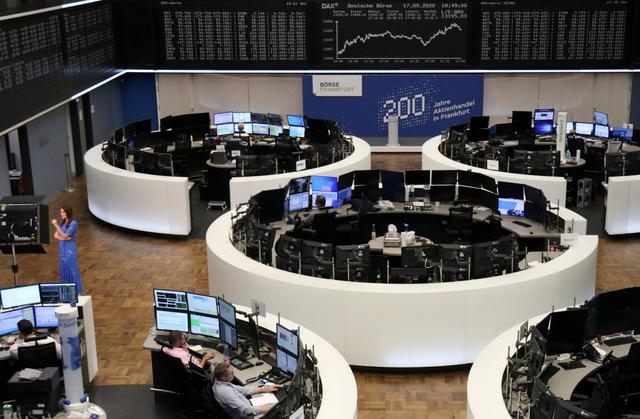Tech lifts world stocks as economy back in focus

World shares stabilised and the dollar rose on Wednesday with overnight gains of stay-at-home Wall Street tech champions helped balance concerns that new restrictions to counter resurging coronavirus infections will hurt economic recovery.
First indications from global surveys about economic activity in September gave a gloomy picture for Europe with rising COVID-19 infections leading to a downturn in services.
MSCI world equity index .MIWD00000PUS, which tracks shares in 49 countries, was 0.2% higher by 0821 GMT, while the pan-European STOXX 600 .STOXX benchmark rose 1.1%.
Tech shares were the strongest gainers in Europe following a rally overnight in big U.S. tech stocks Amazon AMZN.O, Microsoft MSFT.O, and Apple AAPL.O.
“This strong performance on the part of U.S. stocks is likely to translate into a similarly positive open for European stocks,” said Michael Hewson, analyst at CMC Markets in London.
“However there is rising concern that in light of surging infection rates across Europe, and the beginnings of a rise in hospitalisations, that the economic rebound from the lockdown lows is set to finish the year with a whimper,” he added.
The PMI survey showed euro zone business growth ground to a halt this month as the service industry shifted into reverse, knocked by a resurgence in coronavirus cases that pushed governments to reintroduce restrictions.
French business activity slowed to a four-month low in September, while Germany’s private sector continued to recover from the coronavirus shock.
Earlier, MSCI’s broadest index of Asia-Pacific shares outside Japan .MIAPJ0000PUS rose 0.2% for its first gain this week, but the mood was hardly bullish. Japan’s Nikkei .N225 returned from a two-day holiday to slip 0.1%.
Nasdaq futures NQc1 remained near Tuesday’s highs, up 0.1%. S&P 500 futures ESc1 were 0.3% higher.
In foreign exchange markets, the standout mover was the gaining dollar, which was up 0.10% against a basket of six major currencies .DXY at its highest level since July 27.
“Risk aversion on the back of new COVID-19 infections affecting Europe more directly remains an important factor this week,” UniCredit strategists said in a note. “This means that the USD is likely to remain firm in its role as preferred safe-haven currency.”
Meantime the euro EUR= hit a seven-week low and was last down 0.12% at $1.1693, on concerns about coronavirus infections and after the tepid European surveys.
Commodities were also weighed down by the robust dollar and worries linked to economic impact of a second wave of COVID-19.
“A resurgence in cases could prove to be a stumbling block for the demand recovery, although any lockdowns moving forward are likely to be more targeted and localised,” said ING commodity strategists Warren Patterson.
Brent crude futures LCOc1 were last down 0.2% at $41.64 a barrel and U.S. crude futures CLc1 slipped 0.3% to $39.69.
Gold prices touched a six-week low as the dollar strengthened. Spot gold XAU= fell 1.2% to $1,875.7 per ounce.
In bond markets, Italy’s 30-year bond yield fell to a record low as the country’s debt remained supported after local elections reduced the risk of a snap election.
U.S. bonds were steady, with the yield on benchmark 10-year U.S. debt up less than one basis point at 0.6724%







